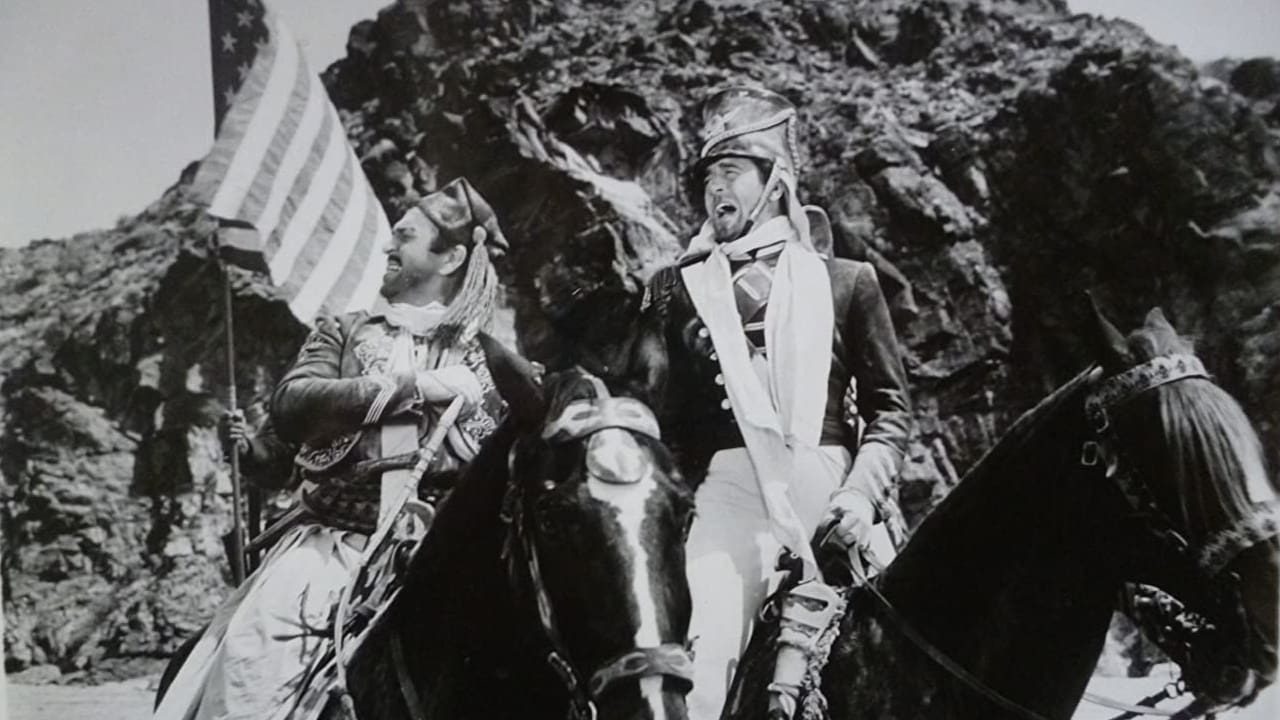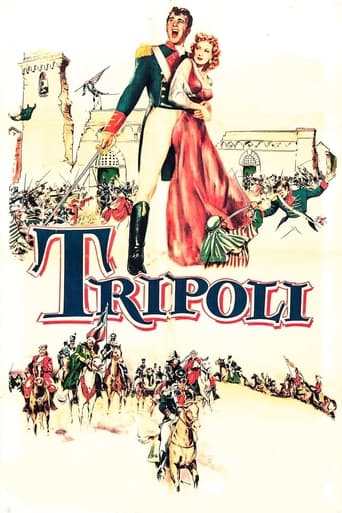

In case you saw To the Shores of Tripoli, a 1942 military romance starring John Payne and Maureen O'Hara, you might assume Tripoli, a 1950 military romance starring John Payne and Maureen O'Hara, would be exactly the same movie. It's not. Neither one of them is very good, but they are quite different.Tripoli takes place in the early 1800s. Pirates in Libya fight against the Marines, and the subsequent march through the desert and battle show audiences why the first line of the USMC theme song starts the way it does. However, the movie is pretty boring, and without the forced romance between John and Maureen, it might have put me to sleep. She starts the movie involved with Phillip Reed, and it's clear she has no real feelings for him but is only after his money and his title. But, since Hollywood was pretty racist back then, it's beyond clear she won't end up with the non-white guy. There's really no suspense, and it's no surprise that she falls for the first white guy she meets.Unless this part of history or battle in particular really interests you, find yourself another war movie. There are thousands to choose from.
... View MoreThe audience gets jipped out of seeing an interesting film because Hollywood is too busy writing checks for unnecessary production values that cost the studio a small mint.See the oxen, camels, and fake palm trees as John Payne runs around trying not to look too embarrassed wearing his marching band hat. Meanwhile, Maureen O'Hara does her spitting and grunting shtick as she scowls through the whole flick (as usual). Mostly boring with few script directions.Hollywood put a lot of effort into these silly costume adventures because the producers are all deadheads with a penchant for wasting time and money.
... View MoreEvery movie set in the Near East in the 40s and 50s had to have an interlude featuring dancing girls. I've always reveled in them. These are typical. Set to Lucien Cailliet's imaginative stereotypical score (oboes and drums), these half-dozen beauties whirl around and suffer abdominal contractions out of Martha Graham, followed by diaphanous veils and whatnot, but discretely dressed in harem pants and bustiers. No pipiks allowed.It's 1805 and the Barbary Pirates along the North African coast have been harassing ships plying the Mediterranean. President Jefferson decides to put a stop to it by barricading their port and sends a few naval ships and a detachment of US Marines to the shores of Tripoli. John Payne is picked to lead the group. Their uniforms are splashy enough to coagulate your eyeballs.So is Maureen O'Hara as the fiancée of the local sheik from whom Marine Lieutenant John Payne must recruit mercenaries to attack the outpost at Derne, overlooking Tripoli. She's stunning in her pastel gowns, orange flame lipstick, and eyelashes long enough to dust venetian blinds. Her comic sidekick is Connie Gilchrest, whose haimische New York accent no one tried to fix, thank God. Lieutenant Payne has the requisite earthy sergeant, Grant Withers, but it's the Victor McLaughlin role and Grant Withers looks and acts like he's been holding hands with a bottle for the past thirty years.Maureen O'Hara, outstanding in a few movies, including "Our Man in Havana," overacts outrageously, but then the director appears to have ordered everyone to overact, so the obviousness assumes a style of its own. If O'Hara is voicing an opinion that sounds suspicious and underhanded to Payne, he doesn't merely glance at her. He frowns, squints and stares directly at her for as long as she speaks. She's sassy, as usual, but the hero helps her find her identity as a compliant mate, as usual. If it isn't John Wayne it's John Payne.O'Hara's figure is fictional, delightfully so, but Presley O'Bannon was real, and so was the commander of the detachment, William Eaton, whose title was Naval Agent to the Barbary States. The titles matched the uniforms. In fact, the story, glamorized and given a commercial sheen in the Hollywood style of the period, sticks fairly close to historical fact, overlooking the occasional irritating inconsistencies that are found in real life. As in history, Payne hires a hundred or so mercenaries who turn out to be a mixed bag of Arabs and Greeks who don't like each other much.Situation report. I was never much of a technical writer and realize the observations above are a little entropic so let me summarize. Half way through the movie, John Payne is leading this motley of Arabs, Greek mercenaries, and ten Marines across the sand dunes of north Africa, with the intention of deposing the miserable wretch who is pirating our ships in the Mediterranean. Maureen O'Hara has her eyes on the wealthy Arab leader but Payne doesn't want her along and has forced her to travel with the "dancing girls." Payne and O'Hara hate each other but the discerning viewer knows how it will work out. There are the usual hazards of journeying across the desert -- lack of water, sandstorms, haboobs, intrigues, shifting allegiances. Some nice location shooting, apparently somewhere near Palm Springs. The model work and special effects are quite good too for the period.The ragtag army finally reaches the sea and gratefully draws supplies from the ships of the US Navy. The plan is to bombard the fort at Derna into submission, then have Payne and his unit charge into the rubble and mop things up. The great battle takes place.But guess what? The Arabs were a clever bunch. (They invented soap in the Middle Ages, but also algebra, an Arabic word, a dirty trick for which they can never be forgiven.) And here, just as the enemy seems about to lose Derna to the Marines, the Arabs break out thousands of hand grenades based on NUCLEAR FISSION and they blow Payne and his attackers to pieces, the disjecta membra thrown into the sea. And when the Arabs are done ravishing Maureen O'Hara, and event that has left her incandescent with pleasure, she too is flung off a cliff to the waiting Kraken. It's a tragedy, true, but an exceptionally light-hearted one.
... View MoreI've seen this film a number of times on TV and caught it in the theaters over a half-century ago and loved it. As a kid, it had great appeal to me and lots of action, fun and, of course, the lovely Maureen O'Hara, who was always worth the price of admission. John Payne was an underused, underrated actor who always turned in solid, albeit low key, performance. This film, which is a yarn based on the military action of the US Marines against the Tripoli pirates basically spins fight scenes between the bad guys and a coalition of good guys, including veteran character actor Howard Da Silva as a Greek mercenary. The good guys win, of course and Payne gets the girl (but we knew that anyway, didn't we?) and this is a film that if it pops up on the late show (no video or DVD listed), is certainly worth checking out for some good, solid escapism.
... View More